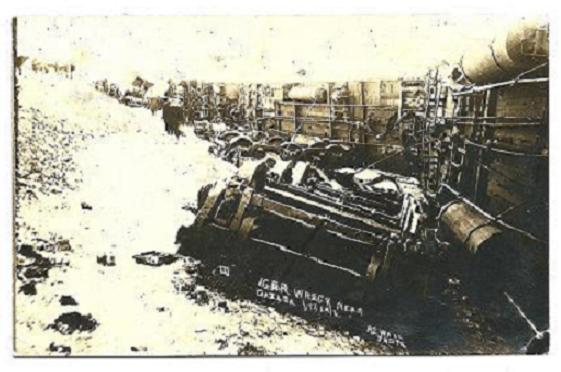 |
Gaza Train Wreck |
 |
 |
Gaza Train Wreck |
 |

TRAIN WRECK NEAR GAZA
***
Many Hurt, Some Badly, When Cars Leave the Rails
***
COACHES ROLL DOWN THE BANK
***
Extra Baggage Car Jumped Track
And Tear it up, Causing
Others To Tip Over
***
Pat Farmer, the section boss at Gaza, had a leg broken, O.G. Sage, veteran passenger conductor on the Central, was thrown out and injured internally. Chas Kopp, of Primghar was thrown through a window and had his arms cut, the bones of one arm being broken and protruding through the flesh. A traveling man was badly cut about the head and one other man had a leg broken.
The train was a heavy one and was running slowly on account of the cold and had lost twenty-five minutes in coming from Cherokee. The engine and Pullman sleeping car stayed on the grade. The engine remained on the rails but the sleeper was off the track and tipped on one side. The rear passenger coach dropped some fifteen feet off a bridge but lighted right side up. The other two coaches and bagggage and mail cars were thrown down the grade and fell on their side. The fact that no one was killed is considered almost a miracle and had the train been running fast the damages would have been enormous in loss of life.
Within an hour and a half from the time Cherokee received word of the wreck a relief train was at the scene of the disaster with doctors and nurses. The injured were taken to Cherokee. Before this train had arrived Dr. Avery and Dr. Rogers, of Primghar, assisted by a physician who was on the train rendered first aid to the passengers and train men injured. R.E. Wall, J.E. Wall, J.E. Hicks, Hal Coffman were among the Primghar people on the train who were shaken up but not injured. Everyone on the train but the engineer and fireman, the sleeping car porter and two or three passengers in the sleeping car, rolled with the tumbling cars to the foot of the grade. The train carried about 80 passengers and half of them were more of less injured.
The track was blocked for nearly a day. The company managed to operate trains to and from the scene of disaster, by transfering around the wreck. The opera company was gotten to Sioux Falls but so many of them were hurt that their performance was abandoned. The cold weather contributed to the troubles of the injured but good work by rescue parties from Gaza and Primghar and the country nearby did much to ease their suffering.
From The Paullina Times January 20, 1916
Postcard from Kristin Frish
